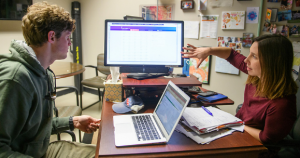Transfer Students
Thank you for considering the University of Mississippi for part of your path to a health professional school! We encourage prospective transfer students to be in touch with our office as early as possible to make sure you complete the necessary courses before you transfer to UM. Please contact our office at (662) 915-1674 or hpao@olemiss.edu to talk with an advisor.
Transfer Credits
The academic advisor for your degree will assist you in determining how your transfer credits will count for the degree program. Likewise, we will assist in determining your status towards completion of the prerequisites for the health professional schools of your choice. We recommend you touch base with the appropriate health professions advisor from our office after you make your schedule with your academic advisor at Orientation to ensure your schedule meets the appropriate rigor and level for your health profession of choice. You may email your ID number and schedule to hpao@olemiss.edu or set up a meeting on our website.
To get a good start on understanding how your transfer credits will count within your major, please visit the UM website Transfer Equivalency Database, an extremely valuable resource for determining the specific transfer credit you will receive at UM. When new students register for orientation, the Office of the Registrar will create a Transfer Equivalency Report that becomes the official document showing your transfer credit information at UM. This document will be found within your MyOleMiss account at the university. Please make sure you send updated transcripts from ALL colleges including dual credit to Admissions in a timely manner to ensure we can help you enroll in the best courses. If you are still enrolled in courses when you come to transfer orientation, please bring a record of the courses you are currently enrolled in with you and notify your academic advisor.
What can you be doing before the transition to the University of Mississippi?
Don’t Break Up a Science Sequence.
If you begin a science sequence at your transfer institution, we recommend finishing out the sequence to ensure you have the requisite knowledge. For example, if you take General Chemistry I, we recommend you finish with General Chemistry II before transferring. Same for General Biology I and II, Organic Chemistry I and II, and General Physics I and II, and Anatomy and Physiology I and II. For questions about what courses transfer in as, please utilize the UM Transfer Equivalencies Tool.
Learn to study smarter.
Get in the habit of studying and preparing for your classes. Health related professional schools are VERY COMPETITIVE! Learn to study and learn what works for you so that once you are at the University of Mississippi you will be ready for your classes, especially your science and math courses. Additionally, get in the habit of interacting with your teachers and using your resources effectively. The main goal is to study smarter, not harder. At the University of Mississippi, we have the Center for Excellence in Teaching and Learning, with free assistance in study skills among other key skills for success. Meanwhile, there are many free resources out there to help you learn how to learn such as:
https://www.educationcorner.com/habits-of-successful-students.html
 Read.
Read.
You can read anything! This is very important because it will help you with your classes and standardized tests. As you already know, the amount of reading increases in college, and you need the skills for quick, effective reading in all your classes, from reading textbooks and scientific journals to novels and exam questions.
Get involved!
Be involved in your community, volunteer, or join a service organization at your current institution. These are all important aspects that you will want to have on your resume. Health related professional programs desire students who have great grades but are also involved on campus and in their community. Start being involved before your transfer to UM, and it will make your transition easier. In fact, these professional programs do not want to see students getting involved with community service at the tail end of their undergraduate years (just before application), but want to see a rich history of increasing involvement in activities that shape your interests and your character.
Keep a journal.
Write down all your activities, all community service, and awards. Get in the habit of writing down all the things you do, especially activities and events that impact you, and all the awards you may receive. Showing prolonged and/or increasing involvement through causes you are passionate about resonates with professional schools. When you apply to health-related professional programs, all these things will be asked and are important, so get in the habit now and continue keeping a journal after you transfer to UM.